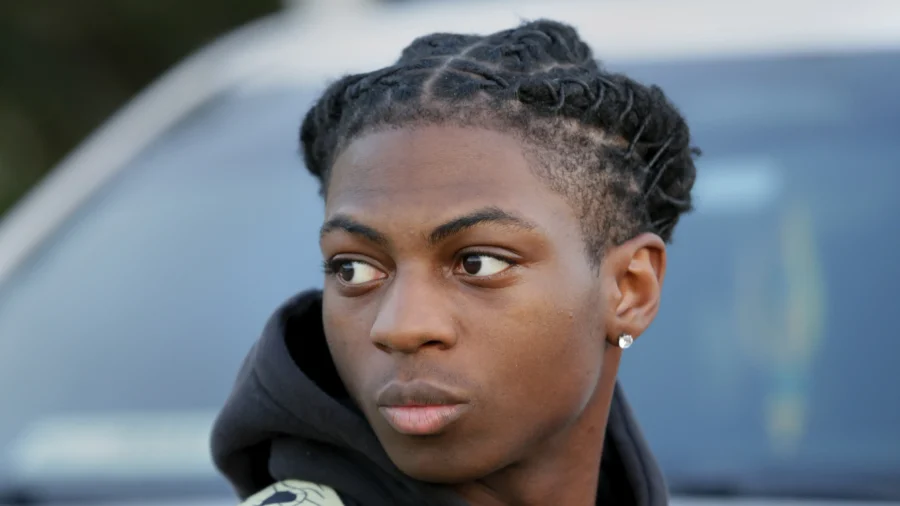A Texas school district that punished a black high school student for refusing to change his hairstyle did not violate a new state law that prohibits race-based hair discrimination, a judge ruled on Thursday.
Darryl George, 18, is a junior and has not attended his regular classes since Aug. 31 because his high school in Barbers Hill ISD says his hair violates the district’s dress code policy.
The Houston-area school district filed a lawsuit arguing that Mr. George’s hair exceeds the length permitted for boys. Mr. George has dreadlocks tied and twisted on top of his head, but the district says his hair would fall below his shirt collar, earlobes, or eyebrows when let down.
The district said other students with dreadlocks have complied with its hair length policy.
State District Judge Chap Cain III ruled in favor of the district, saying its ongoing punishment of Mr. George over the length of his hair is legal and does not violate the CROWN Act.
The CROWN Act, which took effect in September, prohibits schools and employers from adopting policies that discriminate against a hair texture or protective hairstyle commonly or historically associated with race. Protective hairstyle is a term used to include Afros, braids, dreadlocks, and twists.
Mr. George has spent most of his school year serving in-school suspension at Barbers Hill High School in Mont Belvieu or spent time at an off-site disciplinary program.
“We appreciate the court giving clarity to the meaning of the CROWN Act,” said Sara Leon, an attorney for the school district.
The district offered no witnesses to testify before the ruling, instead only submitting evidence that included an affidavit from the district’s superintendent defending the dress code policy.
Dozens showed up at the courthouse to support Mr. George and his mother, Darresha George, for the one-day trial in Anahuac.
Mr. George said, “it was just sad” that he was being punished for his hairstyle.
He said his hair makes him “feel closer to my people. It’s how I feel closer to my ancestors. It’s just me. It’s how I am.”
His attorney, Allie Booker, presented two witnesses for testimony, including Ms. George and Democratic state Rep. Ron Reynolds, who was one of the co-authors of the CROWN Act.
Mr. Reynolds told the court that hair length was not addressed specifically when the CROWN Act was proposed, but “length was inferred with the very nature of the style.”
“Anyone familiar with braids, locs, twists, knows it requires a certain amount of length,” Mr. Reynolds testified.
The judge asked Mr. Reynolds if there was anything in the legislation that mentioned hair length.
Mr. Reynolds said there was not, but it would be “almost impossible for a person to comply with this (grooming) policy and wear that protective hairstyle.”
The school district maintained in court documents that its policy does not violate the law since the CROWN Act does not have provisions regarding hair length.
In January, Barbers Hill Superintendent Greg Pool took out a paid ad in the Houston Chronicle in January defending the school dress code policy.
He wrote that districts that follow traditional dress codes are safer and have higher academic performance and that “being an American requires conformity.”
Mr. George’s family has also filed a formal complaint with the Texas Education Agency and a federal civil rights lawsuit against Gov. Greg Abbott and Attorney General Ken Paxton, along with the school district, alleging they failed to enforce the CROWN Act. The lawsuit is before a federal judge in Galveston.
In May 2020, Barbers Hill’s hair policy was also challenged in a federal lawsuit filed by two other students. Both withdrew from the high school, but one returned after a federal judge granted a temporary injunction, saying there was “a substantial likelihood” that his rights to free speech and to be free from racial discrimination would be violated if he was not allowed to return. That lawsuit is pending.
From The Epoch Times


